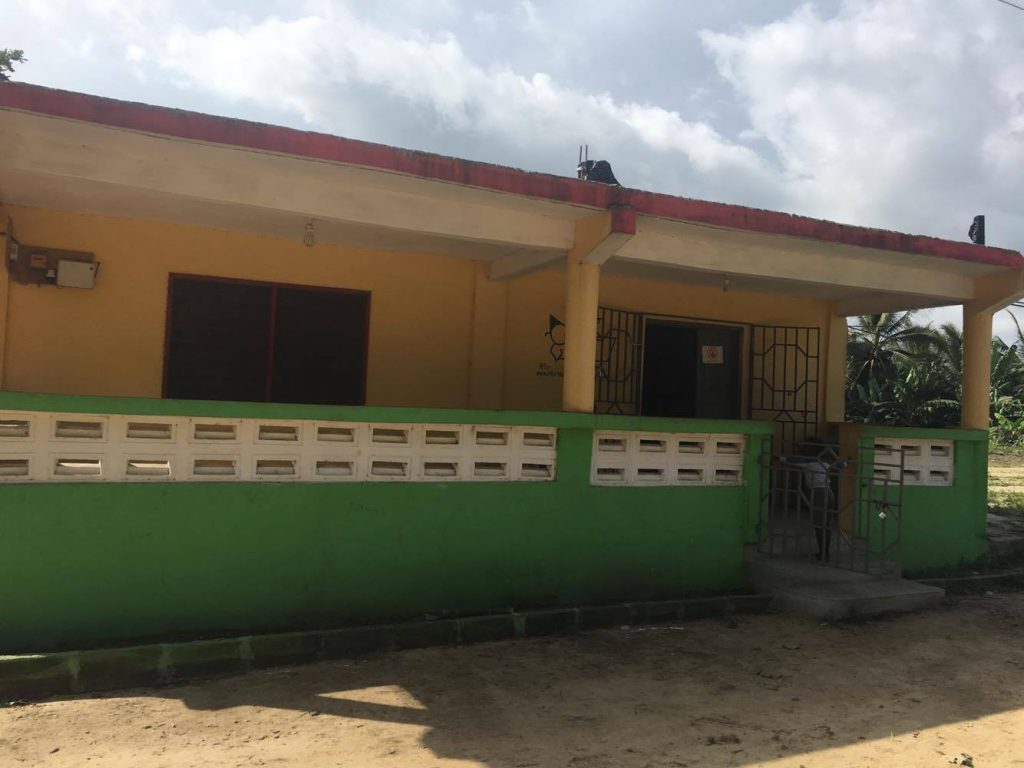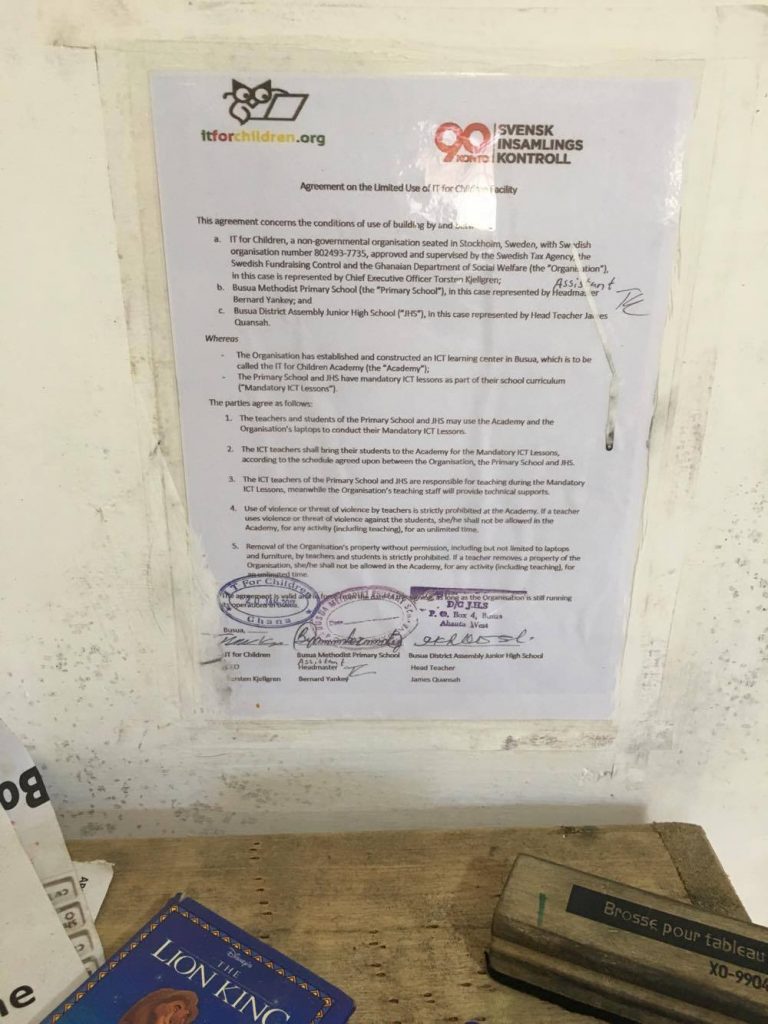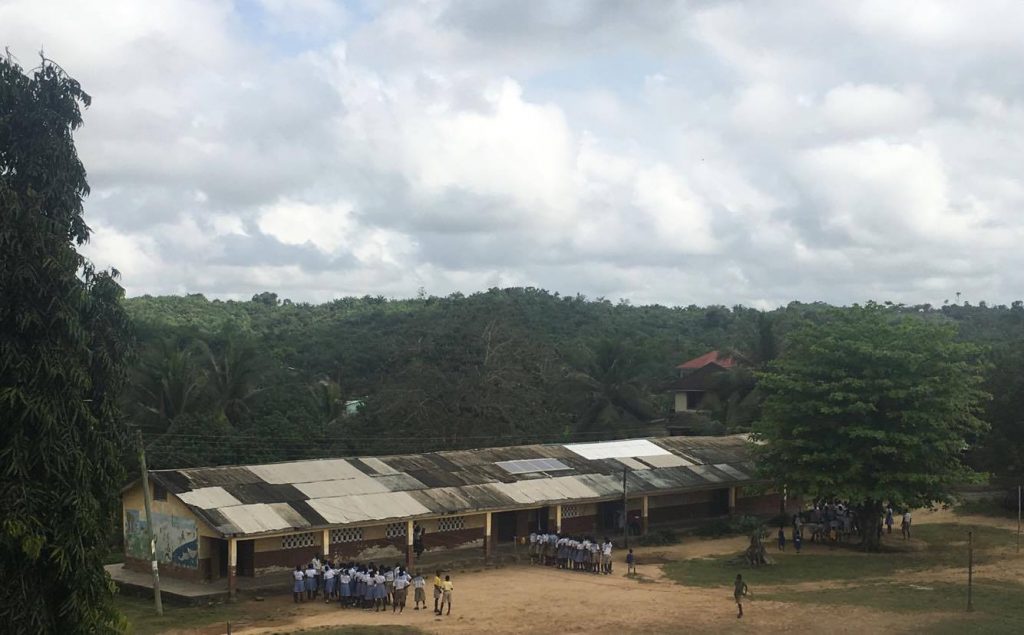Egert writes a blog from Ghana. See what he’s doing there.
For the past month I have worked at the IT centre here in Busua, where children are taught how to use computers. The centre opened in 2015, and last year its first, two-classroom building was finished. The is space for over 40 students in the building and with the help of a Swedish organisation there are over 30 computers which the students use every day. In the first half of the day, regular school lessons are held in the classrooms, and from 2 p.m to 5 p.m students are welcome to practice their skills on the computers. Within the next two years, two more classrooms will be built and solar panels placed on the building’s roof so the frequent power cuts )sometimes we are without electricity for 4 days a week) would not disturb the classes.The organisation has big goals: by 2030, they plan to open these kinds of computer classes all over Ghana and teach children to use computers.
Local IT teacher Theresa agreed to talk to me about the work she and the organisation are doing.
When did you start working at the IT centre?
In the summer of 2016, I started as an intern and already the same autumn I started working as an IT teacher.

What do you parents think about your job? Have you taught them how to use the computer as well?
My parents are happy that I’m working here. They have always wanted me to have practical skills before starting university. They also understand that I will get ahead much better at the university if I have good computer skills. They also like that I am teaching children – I have also introduced my two brothers to computers, they both attend my classes.
My father has been to school and he is familiar with computers – he can write and use some of the programs. Unfortunately he has to work in the shop all the time, so he hasn’t got much time to learn to use the computer better. My mother couldn’t attend school due to poverty, she cannot read or write, but you need these skills to use a computer. Of course she knows which folder the films are in and sometimes watches those.
How many children come to the computer class during the day?
During lessons, whole classes come here with their teachers and after classes there are usually 30 to 40 children.
Do the children’s parents allow them to come to computer class?
In the beginning it was a problem, because the parents didn’t know what computers were and what exactly the chldren were doing here. We started our work at the library and during this time we face the biggest problems: parents came to look for their children and didn’t understand why they are not at home working.
Last year, our new building was finished and from the beginning the included the local community into the process. At first it was difficult to explain our activities to the local authorities. Tony and I attended the village meetings to introduce our plans, but as we were younger than the community leaders, nobody wanted to listen to us. Finally we managed to break through and now we have their support. The village leader even came to the opening of the new facility, and also the parents, so they could see what we were doing in this buidling. After that everything turned out for the best and we have won their trust. Now parents let boys come to the centre.
What about girls?
It is easier for the boys to come, because they don’t have to do household chores. With girls it’s more difficult, they have to help their families with cooking, looking after other children, cleaning. Unfortunately this is an old tradition and needs to be changed. Many families live by these rules and ruin their children’s future by doing so. We have noticed a slight change, but girls are still in minority in the class (one girl per seven boys).
Some kids cannot come to the computer class because they have to sell vegetables on the street in order to be able to eat lunch the next day.
If course there are also those parents who care a lot about their children’s future. A mother, who lives five kilometres from the village, walks here every day with her son and waits for him until the computer class is over and they can walk back together. She does so because there have been many robberies and a few murders, but she doesn’t want her sone to miss anything.

You have rules for using the classroom hanging on the wall and it says that physical punishment is not aloud. Why have you pointed it out like that?
Before teachers started coming here, we had a meeting with them where we explained to them that in this building, we do not tolerate the physical punishment of children. In addition to it being an ethical principle this has also security reasons. In our schools, teachers usually have chains which they use for scaring children and sometimes even hitting them. They do that because they are afraid that otherwise students would not obey. If we would use similar chains in a computer class, where there are many wires, some students may become scared, and trip into the wires while running. Moreover, the chain may fly off and damage the computers. Therefore, together with the teachers, we agreed upon the “code of conduct”. In schools, they have other rules and unfortunately it is allowed to use physical violence against children there.

Why don’t you teach adults at the IT centre?
The first reason is that we are too young, I’m 21 and Tony 24 and in this culture age is very important. Here, older people do not listen to younger ones, they would feel humiliated then. This opinion is changing, but many people still think that younger ones cannot teach older ones. Still, we have some teachers that wish to use the computer – they come here secretly to learn how to. Furthermore we don’t have enough space – when we’ll get three more classrooms, we can think about it more seriously.
What would you like to change here in your community, Busua?
In this community and all over the country the main problem is frequent blackouts, which disturb as tourists well as locals. Also there is a lack of diverse food, the choice of food is limited and you can’t find any “tastes of the world” here.
The last and utmost problem is security. Years ago we had many tourists around here, now I only seldom see them moving on the streets. Five years ago, there were 10 tourists per every local person, but not anymore. For example when tourists go hiking, they may end up being robbed – there have been several cases like that and it’s not normal. Most of the locals’ livelihood comes from selling products, meaning that the existence of tourists is crucial and we need to work more on making the environment secure.

You’re only 21, what are your dreams?
Since when I was a kid, I’ve always wanted to be a social worker, a doctor or a nurse. When I was little, then my mother was ill and I often had to live with my uncle. Therefore I know how hard it is to grow up without parents. Every time I see homeless children or children who are mentally ill, I become sad and I goes straight to my heart. My biggest dream is to open an orphanage where I could help them.
Since you are here...
It is important to protect everyone’s human rights, because it helps to keep stability and peace in the society. There are many challenges for protection of human rights in Estonia: intolerance has really come out of the closet. Bad things happen when good people are too passive, but together we can make a change.
Estonian Human Rights Centre is the competent, accountable and impactful independent human rights organisation in Estonia. Your recurring or one-time donation helps to stand up for human rights everywhere: in courts, in the media, in schools, in the workplace, on the streets and in governmental venues.
Donating is easy, and you can use your credit card if donating from abroad.
Donate now